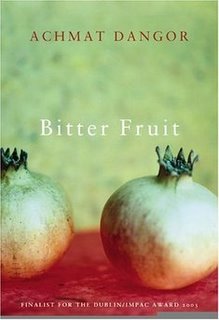Bitter Fruit by Achmat Dangor
 Bitter Fruit was a finalist for the Booker for 2004 and also for that new Irish prize. It was first published in South Africa in 2001. Like his better-known countryman and two-time Booker winner, J.M. Coetzee, Dangor deals with post-Apartheid South Africa, but Dangor’s novel presents some barriers for the reader who doesn’t know South Africa. Conversations are sprinkled with Afrikaans words that are not always understandable from context and the reader may be perplexed by political references. The geography is strange too—I had to look up on a map to see exactly where Johannesburg is compared to Cape Town and the sea for instance. However, I only care about the map with books that give me an acute sense of place—and this one did.
Bitter Fruit was a finalist for the Booker for 2004 and also for that new Irish prize. It was first published in South Africa in 2001. Like his better-known countryman and two-time Booker winner, J.M. Coetzee, Dangor deals with post-Apartheid South Africa, but Dangor’s novel presents some barriers for the reader who doesn’t know South Africa. Conversations are sprinkled with Afrikaans words that are not always understandable from context and the reader may be perplexed by political references. The geography is strange too—I had to look up on a map to see exactly where Johannesburg is compared to Cape Town and the sea for instance. However, I only care about the map with books that give me an acute sense of place—and this one did.The novel’s main characters are Silas Ali, his wife Lydia and their son Mikey (or Michael). Silas (son of a Muslim of Indian origin and a white mother) had been a member of the underground during the last years of Apartheid and now has a significant position as lawyer in the Justice Department, focusing on the Truth and Reconciliation Committee’s (TRC) report. Lydia comes from a family with strong ties from the black middle class. Mikey, now 19 and a university student, is the child of rape. Lydia was raped by a white police officer while Silas was arrested and beaten in a nearby van. At the beginning of the novel, Silas sees the man who raped Lydia in a local grocery store and when he tells her about the encounter, she drops a glass and walks on it—causing her to be rushed to the hospital where she stays for a considerable time, unable to walk. While she is there, Mikey, whose cousin had been sent to live in Canada after the two were caught “playing Gandhi” (lying together naked without touching) in his room, sleeps with the bisexual white colleague of Silas who volunteers to stay with him (since Lydia worries about him alone while she's in the hospital).
Silas telling Lydia of his sighting of the rapist DuBoise opens up cracks in the family that cannot be papered over. He becomes more depressed and discouraged, with the political situation as well as with his personal life. Lydia quits her job as a nurse to work in an AIDS awareness program, buys a car, becomes sexually active for the first time in years (on a billiard table at a party in the presence of her husband and son). Mikey reads his mother’s diary while she is in the hospital and learns of the rape. Ironically, it triggers his interest in Silas’ late grandfather, a well-known IMAM at a local mosque. He gets involved with “cousins” who are undoubtedly part of radical organizations who help him get weapons and encourage him to live underground.
The novel blends the racial, the sexual and the political or maybe when politics involves race it then automatically involves sex as well. There’s a character who tells Mikey that conquerors win ultimately by bastardizing the children. There are suggestions that the blending of the races produces beauty and sexual attractiveness as well as diverse sexual practices. Mikey is described a beautiful in a particularly sexual way and he learns his power over women early, attracting older women particularly, including his university professors and even his mother. A girlfriend who’s half Afrikaans and half Indian, confesses she’s had sex with her father since she was 14, and is angry with her father only because he’s found someone else. Lydia’s beautiful young man on the billiard table is also of mixed race. Silas on the other hand seems cut off totally from sex and the same time as he’s being cut out of government (as a new President prepares to take office). All his former underground associates, a mix of races and colors, seem to have missed the promised land in spite of their success. I haven’t quit worked out how all this adds up –possibly an inversion of TRC’s goals? Possibly though it just isn’t all connected—Mikey’s involvement with terrorists is believable enough but seems to be taking the novel is an entirely extraneous direction.


0 Comments:
Post a Comment
<< Home